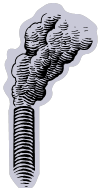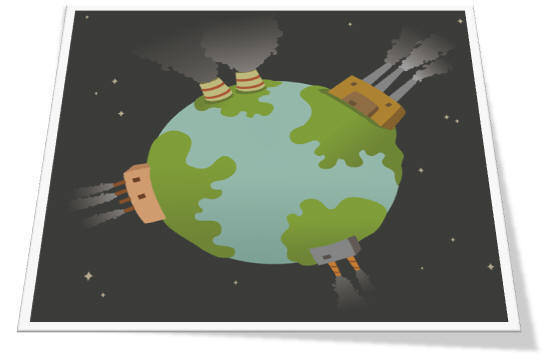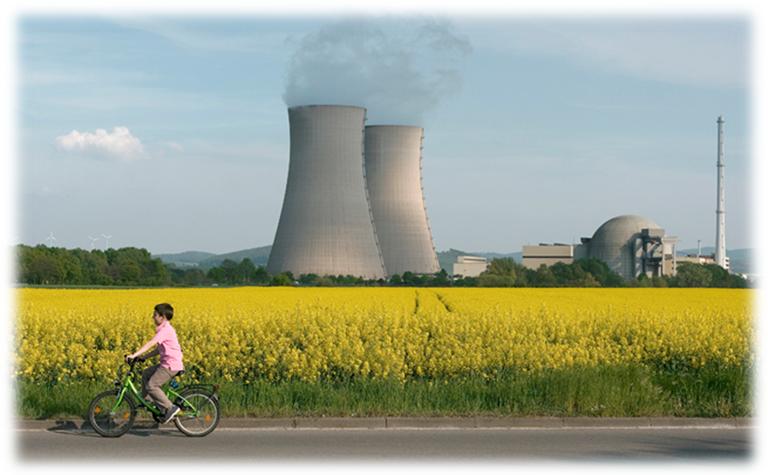L a G r a n E n c i c l o p e d i a I l u s t r a d a d e l P r o y e c t o S a l ó n H o g a r
![]()
Chapter 1: Polluting Our World
Directions: Read the passage. Then answer questions about the passage below.

Proyecto Salón Hogar
|
Thick black smoke curling out of smokestacks, horrible–tasting chemicals in your drinking water, pesticides in your food- these are examples of pollution. Pollution is any contamination of the environment which causes harm to the environment or the inhabitants of the environment. There are many kinds of pollution, and there are many pollutants. Some obvious kinds of pollution are pollution of the air, soil, and water. Some less obvious, or less salient, kinds of pollution are radioactive, noise, light pollution, and green-house gasses. Air pollution can be caused by particles, liquids, or gases that make the air harmful to breathe. There are two main types of air pollution: primary and secondary. Primary pollutants enter the air directly, like smoke from factories and car exhaust. Secondary pollutants are chemicals that mix together to pollute the air, like mixtures of emissions, or waste output, from vehicles and factory smoke that change to form more dangerous pollutants in the air and sunlight. Soil pollution can be caused by pesticides, leakage from chemical tanks, oil spills, and other chemicals which get into the soil by dumping or accidental contamination. Soil pollution can also cause water pollution when underground water becomes contaminated by coming into contact with the polluted soil. Water pollution can be caused by waste products, sewage, oil spills, and litter in streams, rivers, lakes, and oceans. Some scientists believe that water pollution is the largest cause of death and disease in the world, causing about 14,000 deaths in the world each day. Radioactive pollution can be caused by leaks or spills of radioactive materials. These materials can come from medical sources, nuclear power plants, or laboratories which handle radioactive materials. Air, soil, and water can be polluted by radioactivity. It can cause damage to animals, both internally and externally, by eating, drinking, or touching it. It can cause birth defects and genetic problems. It can cause certain cancers and other deadly diseases. Noise pollution can be caused by vehicle, aircraft, and industrial noise. It can also be caused by military or experimental sonar. Noise has health effects on people and animals.
|
Page 1
![]()
|
In people, it can cause high blood pressure, heart problems, sleep disturbances, and hearing problems. In animals, it can cause communication, reproductive, and navigation problems – they have difficulty finding their direction. Sonar has even caused whales to beach themselves because they respond to the sonar as if it were another whale. Light pollution can be caused by advertising signs, stadium and city lighting, and other artificial lighting (like the light caused by night traffic). Artificial lighting has health effects on humans and animals. In people, it can cause high blood pressure and affect sleeping and waking rhythms and immunity. It might be a factor in some cancers, such as breast cancer. In animals, it can affect sleeping and waking rhythms, navigation, and reproduction. In addition, greenhouse gases have caused a warming effect on the earth’s climate. The greenhouse gases are water vapor, carbon dioxide, methane, and ozone. They are naturally–occurring gases in the atmosphere, but human activity has increased their concentration in the atmosphere. For example, the levels of carbon dioxide (CO2) in the atmosphere have risen due to the burning of fossil fuels. The effect is a rise in global temperatures. The higher temperatures cause the melting of glaciers, a rise in the water level of oceans, and the disruption of both land and marine life, including that of humans. Although carbon dioxide is necessary for plants to survive, it is also considered to be a kind of pollution because high levels of carbon dioxide have caused the oceans to become more acidic. It is not possible for anyone to predict the exact timing and effects of global pollution and global climate change brought about by pollution. There is general agreement by scientists that the global climate will continue to change, that the intensity of weather effects will continue to increase, and that some species of animals will become extinct. There is also general agreement, or consensus, that humans need to take steps to reduce emissions of waste products and greenhouse gases into the atmosphere, make adaptations to the changes that are occurring, and figure out ways of reversing the trends of pollution and global warming.
Questions
1) What is an example of air pollution? A. Smoke from factories B. Exhaust from traffic C. Oil from oil spills D. Noise from traffic E. Both A and B are correct. F. All of the above
2) What kind of pollution is thought to cause the most death and disease? A. Air pollution B. Soil pollution C. Noise pollution D. Water pollution E. Radioactive pollution F. None of the above
3) What kind of pollution may a car cause? A. Air pollutionB. Light pollution C. Noise pollution D. Greenhouse gases E. Both B and C are correct. F. All of the above are correct.
|
Page 2
![]()
|
4) What is an effect of artificial light pollution? A. High blood pressure. B. Low energy. C. Hearing problems. D. Birth defects. E. Both A and B are correct. F. Both A and C are correct.
B. necessary for plant survival. C. a kind of green house gas. D. a major source of water pollution. E. A, B, and C are correct. F. A, B, and D are correct.
 Vocabulary
1) Something salient is… B. outstanding. C. dangerous. D. necessary. E. acidic. F. potential.
2) Emissions are… B. waste output. C. pollution. D. All of the above. E. Both A and B are correct. F. Both B and C are correct.
3) What is litter? B. Receptacles. C. Recycling. D. Light pollution. E. Noise pollution. F. All of the above
4) The best antonym for internal is… B. outside. C. external. D. middle. E. Both A and B are correct. F. Both B and C are correct.
|
Page 3
![]()
|
5) Navigation is best described as… A. a primary type of pollution. B. a secondary type of pollution. C. sonar. D. map making. E. direction finding. F. travel planning.
6) If you have a consensus, you have… B. problems. C. scientific ideas. D. pollution. E. Both A and B are correct. F. None of the above.
Grammar: Sentences, Sentence Fragments, and Punctuation Marks
What is a sentence fragment?
A sentence fragment is an incomplete sentence. A sentence fragment is a group of words that does not express a complete thought. It generally lacks a subject or a verb, or its verbal construction cannot exist by itself. Examples: Global warming and factories pollute our. Dozing off in the breeze, in his hammock, by the calm sea. (There are not any action words in either sentence fragment.)
Nouns and verbs combine to make sentences. Sentences have two parts, a subject and a predicate. The subject tells who is doing the action; the predicate tells what the action is. The subject and predicate can be surrounded by words that modify them. A sentence expresses a complete idea. It begins with a capital letter and ends with a period, an exclamation point, or a question mark. Examples: Global warming (subject) is well known throughout the world. The president promised funds to finance cleaning up this world. (predicate)
Read each group of words. Write S if it is a sentence or SF if it is a sentence fragment. __ 1. Dark smoke and pollution. __ 2. In spite of the fair weather. __ 3. How do I start my essay? __ 4. The polluting began a time ago.
Kinds of Sentences What kinds of sentences appear in the beginning of the grammar section? The different kinds of sentences are as follow:
Declarative sentences state a fact and end with a period. The subject comes before the predicate. Example: Pollution destroys the earth.
Interrogative sentences ask a question and end with a question mark. Example: Do you want to help the earth?
|
|||||
|
Page 4
Page 5
|
|||||
|
A dash [-] can be used in place of a comma to emphasize something. Example: Earthquakes - the
problem - had many events. An apostrophe ['] is used in possessive nouns to show ownership and in contractions to show that a letter is missing. Example: The president's dream was to end pollution and global warming.
Quotation marks [" "] are used in direct quotations or to repeat someone's exact words. Example: "I want to see the
earth better again," he said. The comma [,] has several uses. It separates words in a series, sets off an appositive or specific words, and is used before quotations, in addresses, and in dates. Example: The car is a major
pollutant, but now new fuels are coming.
Add punctuation marks to the following paragraph. It was 8 30 at night when I was walking and saw something crazy The lake by my house had all dead fish floating I thought about pollution and global warming causing this but I cannot be sure so I can only assume
A. Write the subject next to the following sentences. 1. Global warming is causing
hot days. ________________ 2. There are many reasons why the
earth is worth saving. ________________ 3. The earth has energy both
physical and spiritual. ________________ 4. Are the whales going to live much
longer? ________________
B. Write S if each group of words is a sentence or SF if it is a sentence fragment. __1. The ozone layer left the earth. __2. The sun is shining brightly and I
am happy. __3. The business, after presenting its
plan!
|
|||||
|
Page 6
|
|||||
|
|
C. Add punctuation marks in the following sentences. 1. The president said tomorrow we will start a major cleaning 2. We need to convert our garbage into energy 3. We will explore investigate and search for the answer to earths problems 4. Meet me at 10 30 so we can talk 5. The earth is very delicate we must be careful 6. Do you want to help save our planet 7. I hope we see a change in our
lifetimes
D. Place punctuation marks to the following paragraph. We can all make a difference in our world if we all pull together and clean this place up Too many people dont care about the condition of the earth But they will when it is too late and see the destruction that their careless thoughts and actions have caused Many people will die if we dont do something soon Believe me you are only one person but your actions can set an example to others
Summary What is a summary? A summary helps you to better understand the main idea of a text, and it is generally more practical to deal with less information. Also a summary helps you analyze a text closely.
When preparing a summary it is important to: 1. Read the entire piece very carefully. 2. Write down the main idea and the best supporting statement in the simplest form. 3. Avoid unnecessary words and write only essential information. 4. Clarify that it is your understanding of a text. 5. Ensure that the summary is brief yet comprehensive, concise, thorough, objective, and complete. 6. Verify accuracy, grammar, spelling, and punctuation.
|
||||
| Page 7
|
|||||
|
|
A summary should not include personal opinions. It should simply report the facts. A summary can be as brief as one sentence per paragraph or one paragraph for the entire work. It should substitute lists with general terms, have very few quotes, and include the title and author of the original work. Thus, a summary is a concise,
thorough, and objective version of a text that states, in one's
own words, the author's main idea.
Write a word to summarize each group of words.
1. apple, banana, pear, kiwi, strawberry
fruits
2. Bahamas, Cuba,
Japan, Australia, Puerto Rico ______________ 3. Robert, Shawn, Victor, Charles,
Barry ______________ 4. Spanish, German, English, Russian, French ______________
Writing a Summary Mark a topic you would like to write about. __ 1. Global warming __ 2. Pollution __ 3. Saving the earth
Drafting Write on a separate sheet of paper a summary of the story "Polluting Our World" focusing on the topic you chose.
Mark the steps to summarize the
story as you follow them. __ 1. Reread the story. __ 2. Write the main idea and the best
supporting statement in the simplest form.
|
||||
| Page 8
|
|||||
|
|
Editing Make sure that you did not include unnecessary words or nonessential information. Specify that the summary is your understanding of the story.
Rewrite your summary in the space
provided. ______________________________________________________________________ ______________________________________________________________________ ______________________________________________________________________ ______________________________________________________________________ ______________________________________________________________________
Look at your summary and check for the following: 1. Make sure that your summary is: A. comprehensive __ B. accurate __ C. objective __ E. thorough __ F. complete __
2. Check grammar, spelling, and
punctuation. Publishing Share your summary with a classmate. Have him or her look over your summary.
|
||||
| Page 9
|
|||||


 5) Carbon dioxide is…
5) Carbon dioxide is…

